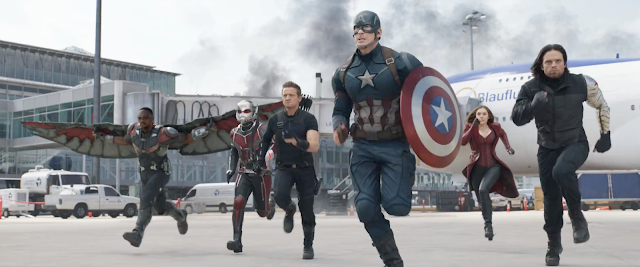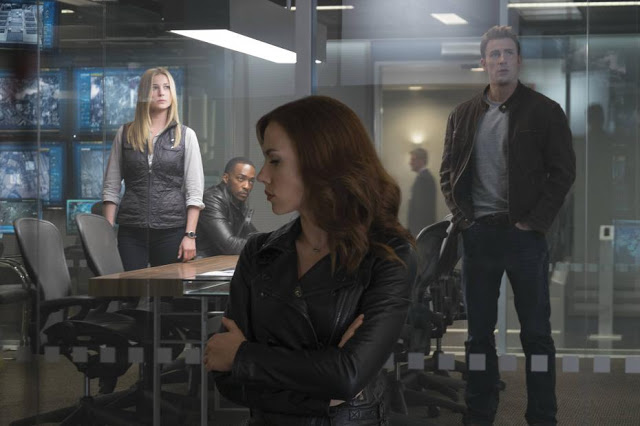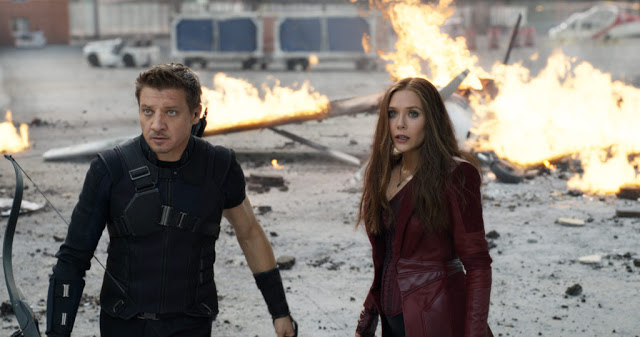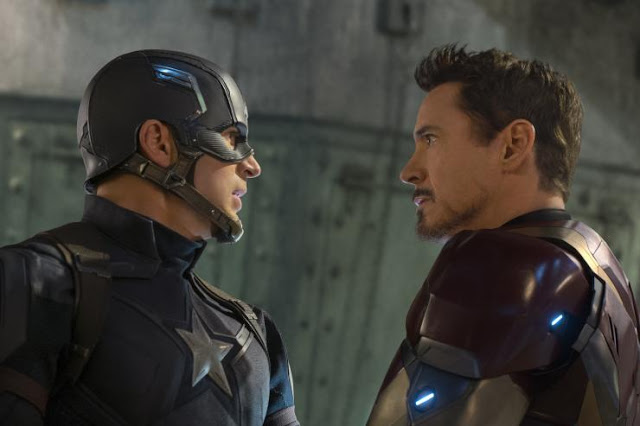Early in Captain America: Civil War, a character called Vision (Paul Bettany) muses on his brethren’s tendency to antagonize. “Conflict breeds catastrophe,” he gloomily intones. Maybe so. But at the movies, conflict is the engine of drama. Yet while the Marvel Cinematic Universe comprises films that feature plenty of fighting, they’re largely lacking in genuine excitement. The Avengers sequel had its Whedonesque charms, but it ultimately amounted to a bunch of costumed warriors trading blows with an army of faceless flying robots. Ditto for Iron Man 3, except there, the robots were the good guys. Ant-Man was fitfully funny, but it was still an absurd movie about a dude who talked to bugs. Thor? Please.
The recent exception to this institutional lethargy—setting aside the terrific Guardians of the Galaxy, which was literally a universe removed from the rest of the MCU—was Captain America: The Winter Soldier. Directed by Anthony and Joe Russo, it was less a superhero movie than a paranoid thriller, and its stripped-down quality lent it a rare spark of intrigue. Now the Russos are back with Civil War, a far more unwieldy but no less thoughtful superhero extravaganza. Like all Marvel movies, it’s large and loud, with special effects and action sequences galore, but it nonetheless feels rooted in its characters rather than its gee-whiz battle scenes. Every comic-book film has combat; Civil War has actual conflict.
It also has superheroes, and lots of them. The title may brand Civil War as a Captain America sequel, but it’s really the third Avengers picture, assembling virtually all of the MCU’s famed warriors, plus adding a few newbies into the mix. (The two major absentees, Chris Hemsworth’s Thor and Mark Ruffalo’s Hulk, are predictably name-checked, though Samuel L. Jackson’s Nick Fury goes unseen and unmentioned.) A whopping twelve characters sport slash marks in their names, signifying that they moonlight as comic-strip alter egos in addition to their human selves. This is an enormous undertaking—if The Winter Soldier hadn’t been so successful, it’d be fair to wonder if Marvel hired the Russos here purely out of recognition that two different people were needed to shoulder the franchise’s escalating weight.
But there’s something strange about Civil War: Despite its sheer size, it doesn’t feel all that heavy. The Russos, along with their regular screenwriters, Christopher Markus and Stephen McFeely, continue to flash a gift for telling colossal stories on an intimate scale. Age of Ultron was equally massive, but it felt fractured, dutifully carving out individual slices of time for each of its characters rather than sculpting a cohesive whole. Civil War, in contrast, possesses a strong sense of purpose and forward momentum. The Russos fulfill their obligations to their studio overlords—lassoing in new characters, pandering to fans, setting up future installments (Phase Three has begun!)—but in the process, they’ve made a movie that actually stands on its own.
If the film feels unified, the same can’t be said for its characters. The thrust of Civil War involves the Avengers’ disparate attitudes and philosophies, particularly in response to the Sokovia Accords. A sort of superhero Magna Carta (named for the fictional site of the dreary climactic bludgeoning in Age of Ultron), the Accords posit that the Avengers, while undeniably capable, are dangerous and perhaps bloodthirsty. They thus demand that the heroes (or is it vigilantes?) submit themselves to the United Nations, which will provide oversight of their activities and serve as a check on their power. Sounds good, right?
Well, does it? That depends on which avenger you ask. Tony Stark, aka Iron Man (Robert Downey Jr.), is nobody’s idea of a great compromiser, but he’s just received a vicious dressing-down from Miriam (Alfre Woodard, set to appear in Marvel’s Luke Cage on Netflix later this year), a woman whose son died during the Avengers’ would-be heroics in Sokovia. Ridden with guilt, Stark insists that he and his cohorts need to be supervised, and he’s supported by Vision, Natasha Romanoff/Black Widow (Scarlett Johansson), and James Rhodes/War Machine (Don Cheadle). On the opposing side of the debate is our title character, birth name Steve Rogers (Chris Evans). The shadowy events of The Winter Soldier have left America’s favorite captain with a deep-seated mistrust of government, and he refuses to tether his talents to an agency whose motives could be tainted. Siding with Rogers is Sam Wilson/Falcon (Anthony Mackie), the pilot-without-a-plane whom we first met in The Winter Soldier, as well as Wanda Maximoff/Scarlet Witch (Elizabeth Olsen), an enemy-of-the-state-turned-patriot who can bend matter to her will.
This argument concerning the morality of the Avengers’ behavior takes up a surprising amount of Civil War‘s opening act, and it’s perhaps a bit weird for a comic-book movie to temporarily transform into a political-science seminar. Still, it’s gratifying that the film actively grapples with its characters’ role in society, weighing the benefits of their freedom-fighting against the cost of collateral damage in the form of human lives. (Contrast this with Batman v Superman, which realized that having its characters inadvertently murder countless civilians was a bad look, then rectified the problem simply by ensuring that its mindless combat sequences took place within abandoned buildings.) Depending on one’s perspective, the Avengers could be viewed as either a troupe of righteous lifesavers or a paramilitary death squad, and the movie doesn’t squarely land on a particular side. Instead, it asks knotty questions, then organically allows the characters’ legitimate ideological differences to germinate into the title schism.
Of course, the real spark that lights this powder keg isn’t the Sokovia Accords. It’s the Winter Soldier himself, aka Bucky Barnes (Sebastian Stan), Rogers’ boyhood friend from Brooklyn. The Winter Soldier‘s reveal of Bucky as its titular sleeper agent was one of its less interesting elements, but it pays off here, as a splintered Rogers finds his loyalties torn between his childhood chum and his current colleagues. Following a big bang, Bucky is accused of a bombing and an assassination, and Stark resolves to apprehend him in order to appease his new bureaucratic partners. But Rogers, convinced of Bucky’s innocence, decides to track him down himself and rescue him from potential imprisonment, existing alliances be damned. And with that: war!
What is it good for? How about entertainment? It’s fair to accuse Civil War of needlessly manufacturing a clash between Iron Man and Captain America, just because that seems like a fun thing to do. But turns out, it is fun. So many Marvel movies feel mechanical, less the labor of creative individuals than the byproduct of a corporate superpower devoted to churning out regular installments, just to keep its ticket-buying audience hooked. Here, however, you can tell just how much the Russos are enjoying themselves. They’re kids again, playing around in their sandbox, crashing their toys together and seeing what happens. The only difference is that the toys have all transformed into excellent actors, and the sandbox costs $250 million.
That’s a lot of money to spend, and the Russos occasionally seem overwhelmed by the blank check that they received. They’re strong storytellers, but they aren’t great action directors, which is why the majority of Civil War‘s set pieces are effective rather than inspired, relying on frantic cutting and chaotic choreography. Yet even here, the Russos’ mastery of tone and character comes into play. They keep things light, but they also grasp the unique opportunity that presents itself when making a movie about superheroes. The combatants here aren’t generic soldiers—they’re distinct individuals, each with a particular set of amazing abilities. This diversity of talent allows the Russos to change up the speed and style of their filmmaking, and to keep the focus on the players, which prevents the movie from turning into yet another boring sound-and-light show. The Russos’ visual signature may be brute-force, but their attention to character makes their action scenes more strategic than assaultive. The variety is exciting: Iron Man and War Machine blasting off in their metallic suits, Captain America flinging that magnificent star-spangled shield all over the place, Clint Barton/Hawkeye (Jeremy Renner) firing super-powered arrows, Scarlet Witch making like a badass Jedi, Spider-Man shooting his sticky webs, Black Widow leaping into—
Wait a minute. Spider-Man?? Where did he come from? Depending on your level of cynicism, the answer is either, “a memo from Marvel demanding the resurrection of one of its most profitable figures,” or “Queens.” Regardless, who cares? The red-and-blue web-slinger, also known as Peter Parker (played by an adorably gawky Tom Holland), is a perfect fit for the Russos, and he epitomizes Civil War‘s lithe style and cheerful humor. (The other key figure introduced here, Chadwick Boseman’s Black Panther, assimilates less gracefully, largely on account of him being so morose.) The movie begins as a grim affair, but it loosens up over time, and the Russos again prove adept at balancing weighty superhero business with light comedy. Kerry Condon scores a few laughs as Iron Man’s disembodied assistant Friday, as does Paul Rudd as Scott Lang/Ant-Man. There are two delightful references to The Empire Strikes Back (one direct, the other stealthy), plus a hysterical nod to The Manchurian Candidate. And Bucky and Falcon, flung together through circumstance, thrive as a hilarious duo grounded in mutual antipathy.
The humor helps, but the Russos’ real coup is how they deftly sidestep the pitfalls that submarine so many modern blockbusters. To begin with, the MCU has always struggled with concocting compelling villains (give or take a Loki); the Russos don’t solve this problem so much as deflect it. Civil War is, surprisingly and somewhat daringly, a comic-book movie without a big bad. Oh, sure, there’s an insidious mastermind (Daniel Brühl) who plots to topple our heroes, but even he recognizes that he’s small-time. The real conflict on display is the rift between the Avengers themselves, and that lends the film’s fight scenes a curious poignancy. We care about everyone involved, resulting in a more complicated viewing experience, rather than the usual vicarious thrill derived from seeing banal evil brought to justice.
That complexity extends to the film’s climax, which is actually—and this is truly gobsmacking—pretty good. Cinematic law requires that all superhero movies conclude with a gigantic, prolonged fight sequence; once again, Civil War doesn’t so much buck this trend as slyly subvert it. There is a refreshing lack of anonymous henchmen in the film’s action sequences, meaning that, for once, we aren’t forced to watch the good guys pummel countless extras. The violence is instead intimate, which makes the punches land that much harder, especially during the finale, in which three men bare their souls as well as bloody their knuckles.
Civil War shows its seams on occasion. The plot makes use of a brilliant red herring, but it also relies on fridge logic. There’s a slender romance between Rogers and a CIA agent (Emily VanCamp) that’s woefully undercooked, even if it results in one of the movie’s best sight gags. And in a sense, the film’s narrative ends where it began, which might make some question the point of the whole enterprise in the first place.
But to focus exclusively on the destination is to miss the pleasure of the journey. This movie is loaded with memorable moments, whether it’s Captain America straining to prevent a helicopter from taking off while using nothing more than his biceps, or Iron Man racing to save a comrade from disaster and failing. There’s real humanity on screen, and that counts for something, especially in an era where blockbusters are becoming increasingly depersonalized. The Russos may not have the flair of Chris Nolan or the wit of Joss Whedon, but they do exhibit a passionate commitment to nuanced storytelling, and that serves as its own form of filmmaking brilliance. After all—and as this movie ably demonstrates—there is more than one kind of heroism.
Jeremy Beck is the editor-in-chief of MovieManifesto. He watches more movies and television than he probably should.




